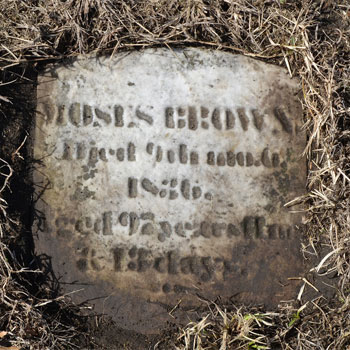Moses Brown (1738-1836)
 Moses Brown A prominent Providence merchant, reformer and philanthropist, Moses Brown was the youngest of the famous Brown brothers born to
James Brown II and Hope Power Brown. Orphaned young, Moses was adopted by and apprenticed to his wealthy merchant uncle, Obadiah Brown. Successful as a
partner with his brothers in the shipping firm of Nicholas Brown & Company, Moses moved into politics as a deputy in the General Assembly in the 1760s.
Moses Brown A prominent Providence merchant, reformer and philanthropist, Moses Brown was the youngest of the famous Brown brothers born to
James Brown II and Hope Power Brown. Orphaned young, Moses was adopted by and apprenticed to his wealthy merchant uncle, Obadiah Brown. Successful as a
partner with his brothers in the shipping firm of Nicholas Brown & Company, Moses moved into politics as a deputy in the General Assembly in the 1760s.
In 1774, Moses joined the Society of Friends, more commonly called the Quakers, and their campaign to end the slave trade and slavery. Moses freed his own slaves and also began to provide other slaves and free blacks with financial and legal assistance. He led the successful effort in 1774 to ban the importation of slaves into Rhode Island, fought for passage of the state’s gradual manumission act of 1784, and in 1787 helped pass a statute that forbid slaving voyages out of Rhode Island ports.
Beginning in the early 1790s, Moses Brown and his partners provided financing for the construction of textile mills throughout southern New England. Brown was instrumental in the development of Samuel Slater’s Pawtucket mill, the first water-powered spinning mill in the United States, an event often heralded as the beginning of the American Industrial Revolution.
After devoting his later years to philanthropy and education, Brown died on September 6, 1836, a week before his ninety-eighth birthday. His body lies in the North Burial Ground’s Quaker section, on land he formerly owned.
